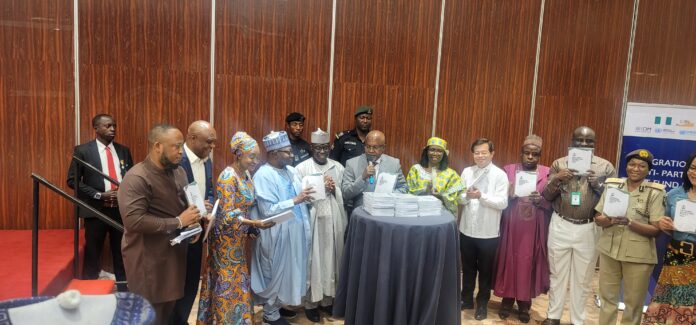By Joel Ajayi
The Federal Government has unveiled the revised 2025 National Migration Policy aimed at addressing the root causes of irregular migration while promoting safe, orderly, and legal migration pathways.
The Minister of State for the Federal Ministry of Humanitarian Affairs and Poverty Reduction, Dr. Tanko Yusuf Sununu, made this known during the meeting of the Technical Working Group on Migration and Development convened to validate the updated policy on Tuesday in Abuja.
Dr. Sununu emphasized the importance of a coordinated national response involving ministries, agencies, civil society groups, and development partners. He noted that the policy aligns with global best practices and international migration frameworks, with a particular focus on mitigating the loss of skilled professionals—especially in the healthcare sector.
He said the revised policy aims to foster “brain circulation” through partnerships between Nigerian and international universities.
“More than 1.4 million Nigerians have emigrated in recent years, with 51 percent of them holding tertiary education credentials,” Sununu stated. “Initiatives such as transnational education agreements will help retain academic and medical talent while fostering knowledge exchange.”
He added that the revised policy reflects Nigeria’s commitment to proactive migration management amid a rapidly changing global landscape.
“Once approved by the Federal Executive Council, the policy will enable collaboration between state governments, civil society, and international partners under a unified strategy. Public education on the dangers of irregular migration is critical, especially as such migration contributes to insecurity in the country,” he said.
Dr. Sununu also referenced ongoing agricultural empowerment initiatives for Internally Displaced Persons (IDPs) and partnerships designed to deliver essential services, including healthcare and education.
He commended the leadership of the National Commission for Refugees, Migrants, and Internally Displaced Persons (NCFRMI) and the contributions of all stakeholders involved. He reiterated the government’s commitment to informing Nigerians—especially the youth—about the risks of irregular migration and the legal alternatives available.
In his address, the Federal Commissioner of NCFRMI, Mr. Tijani Ahmed, explained that the revised 2025 National Migration Policy was developed in collaboration with development partners to address evolving migration challenges in Nigeria.
Speaking at the unveiling in Abuja, Ahmed stated that the policy seeks to balance the opportunities and risks associated with migration, ensuring Nigeria’s practices align with global standards, including the United Nations’ Global Compact for Safe, Orderly, and Regular Migration.
“This update marks a major step toward modernising Nigeria’s migration governance,” Ahmed said. “Originally adopted in 2015, the policy has now been updated to respond to emerging realities such as economic shifts, conflict-driven displacement, and human trafficking.”
The review process was led by NCFRMI and involved a 19-member Policy Review Committee comprising representatives from government, civil society, academia, and international organizations. Ahmed stressed the importance of an integrated approach that ensures the policy is both locally relevant and globally aligned.
Also speaking at the event, the Chief of Mission for the International Organization for Migration (IOM) in Nigeria, Ms. Dimanche Sharon, highlighted migration’s critical role in human development.
She commended Nigeria’s innovative approach and commitment to revising its migration framework.
She pledged IOM’s continued support for the Government of Nigeria and its partners in the successful adoption, resource mobilization, and implementation of the policy—emphasizing its potential impact at the national, regional, continental, and global levels.





